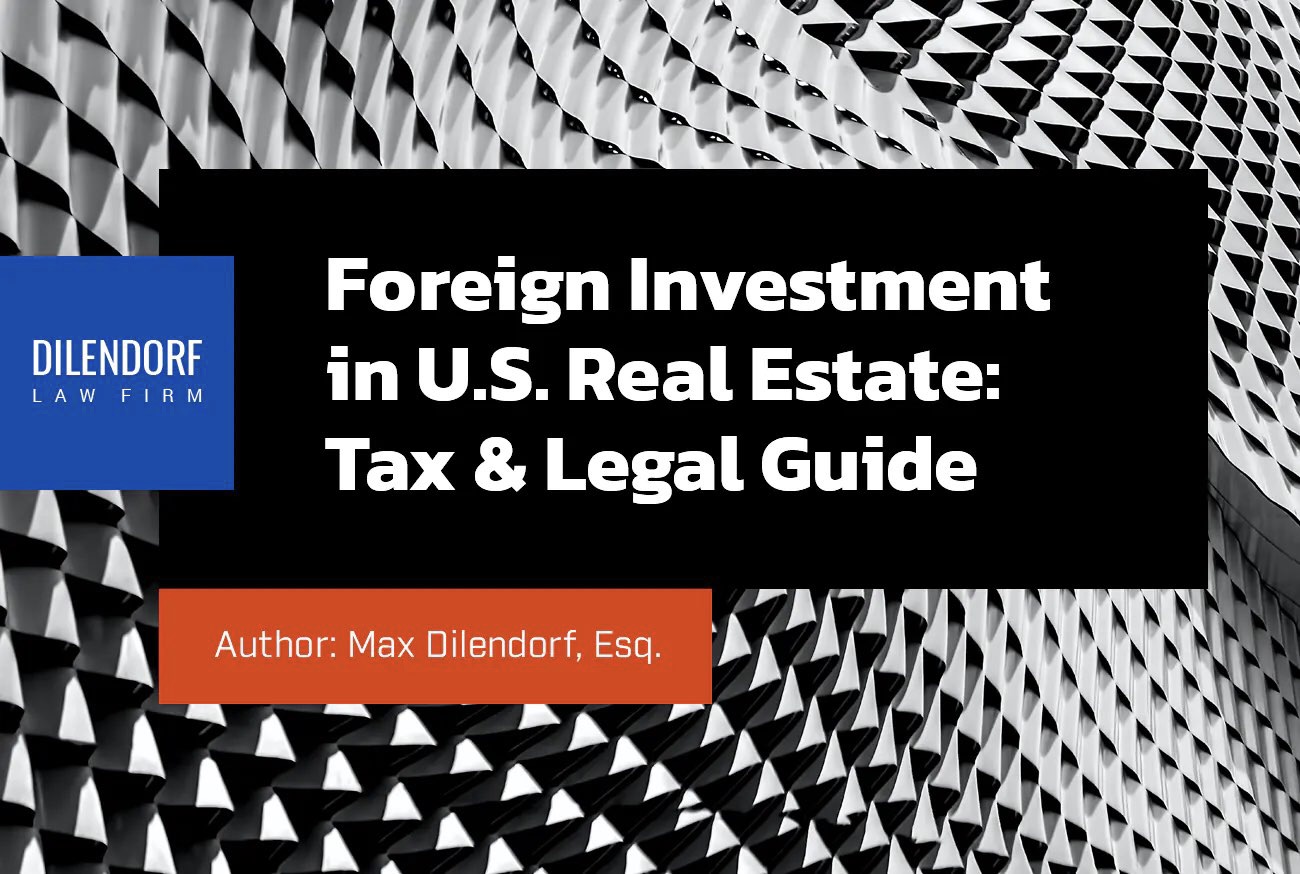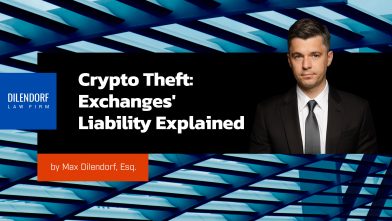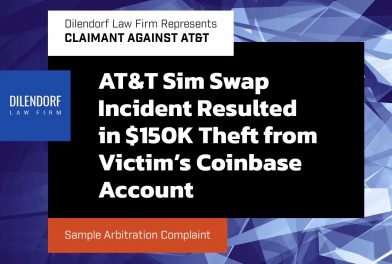Buying US Real Estate As a Foreigner | Common Mistakes
Please get in touch with our team to schedule a consultation to discuss your purchase of U.S. real estate. Email: info@dilendorf.com. Phone: 212.457.9797.

Dilendorf Law Firm represents international clients with the purchase of U.S. real estate. Our team has 50+ years of combined experience representing nonresident aliens in structuring commercial and residential real estate transactions in New York, Florida, California, Texas, and a handful of other states.
As part of our international real estate practice, we identified the top critical issues when foreigners buy U.S. real estate and the questions attached to these issues.
We prepared this summary addressing the essential questions that every foreign buyer should know before starting the planning process.
Not asking the right questions during the planning stage of investing in U.S. real estate could lead to unforeseen tax liability, defeating the entire purpose of the investment.
The summary is not intended to comprehensively describe all federal and state laws and rules that may apply to real estate transactions conducted by nonresident aliens in the U.S.
Whether certain real estate transactions require the formation of a trust structure, claiming double tax treaty relief, or adopting a liquidation plan for U.S. real estate holding structure is a fact-specific analysis that must be conducted on a case-by-case basis.
Completing pre-purchase legal and tax planning analysis will help reduce the foreign buyer’s legal liabilities with owning the U.S. real estate and optimize overall tax exposure to income, gift, estate taxes and FIRPTA withholding.
Specifically, this summary discusses:
1. Why it’s a mistake for non-U.S. citizens to purchase U.S. real estate individually;
2. Why should foreigners avoid buying U.S. properties using limited liability companies (LLCs);
3. Why it’s an expensive oversight not to claim bilateral tax treaties when purchasing U.S. real estate;
4. Why failure to ask the right questions when buying U.S. real estate could lead to disastrous legal and tax liability;
5. Failure to consider the advantage of using a U.S. or foreign trust to buy/hold U.S. real estate;
6. Failure to consider the advantage of using U.S. blocker structure for holding U.S. real estate;
7. Failure to apply for a FIRPTA withholding certificate when selling U.S. property;
8. Failure to take 1031-Exchange Benefits when selling U.S. investment real estate.
1.Why it’s a mistake for non-U.S. citizens to purchase U.S. real estate individually.
A foreign investor may own U.S. real estate directly in their name. However, this is the most form of ownership that exposes the owner to estate taxes, gift taxes, personal liability, income tax reporting requirements, and Foreign Investment in Real Property Tax Act (“FIRPTA”) withholding tax.
Estate Taxes (biggest tax trap for unwary international investors in U.S. real estate)

The U.S. Estate Tax is the biggest tax trap for unwary international investors in U.S. real estate.
Under the current tax law, in 2023, the federal estate tax exemption for nonresident aliens is only $60,00. In contrast, for U.S. citizens, the estate tax exemption will be $12.9 million dollars. It’s double this amount for married U.S. couples, or almost $26M.
Deceased nonresidents who were not U.S. citizens are subject to U.S. estate taxation of their U.S. real estate holdings.
Gift Taxes (2nd biggest tax trap for unwary international investors in U.S. real estate)
The gift tax is a tax on the transfer of property by one individual to another while receiving nothing, or less than full value, in return.
For a nonresident not a citizen of the United States, the gift tax applies to the transfer by gift of real property located in the U.S.
Nonresidents do not have lifetime gift tax credit available to offset tax where such gifts result in a tax liability. In contrast, the US IRS has announced that in 2023, the lifetime gift tax exemption will be increased to $12.92 million per individual (U.S. citizen) and double this amount for married U.S. couples.
In 2023, nonresident aliens could claim $17,000 annual gift tax exclusion available to U.S. citizens and residents.
Example: In 2015, a nonresident couple purchased an investment property in New York for $1 million. The couple wants to gift the property to their daughter, who lives in the U.S. In 2023, the fair market value of the property is $5 million. The couple’s combined federal and state gift tax could be as high as 50% on the gift’s value. The couple could be subject to $2.5 million gift tax to gift the property to their daughter, minus $17,000 annual gift tax exemption.
2.Why it’s a mistake for foreigner buyers to purchase U.S. real estate through LLCs.
Owning real estate through LLCs is an optimal ownership structure for U.S. citizens. Conversely, ownership of U.S. real estate through an LLC for a foreign investor could become an expensive tax mistake for several reasons.
An LLC is a pass-through entity for federal income tax purposes. This means that the consequences of income, estate, and gift taxes are the same as if the foreign person owned the property directly.
The limited liability form of ownership does not shield a foreign investor from U.S. Federal and Estate Taxes upon death. Similarly, if a foreign buyer decides to gift a membership interest in an LLC that owns real estate, the gift will be subject to federal and state gift tax. As discussed in the section above, the combined gift tax could be as high as 50% based on the property’s fair market value.
Many foreign jurisdictions consider U.S. LLCs to be nonresident corporations, taxing distributions from the company dividends. This mismatch in treatment often disqualifies foreign clients from obtaining foreign tax credit, subjecting unwary investors to double taxation at rates of up to 75%. Furthermore, purchasing real estate through U.S. LLC could subject a nonresidential alien to special tax provisions in their home country that result in double taxation.
Generally, foreign buyers should avoid purchasing U.S. properties through LLCs. However, a foreign buyer who is relatively young (and does not anticipate holding the U.S. property for an extended time) and not particularly concerned about estate and gift taxation may find the LLC type of ownership suitable.
3.Why it’s an expensive oversight not to claim bilateral tax treaties when purchasing U.S. real estate.
The U.S. has tax treaties with 68 countries. Under these treaties, foreign residents are taxed at a reduced rate or are entirely exempt from U.S. taxes on certain items of income they receive from real estate investment activities.
From our experience, most foreign buyers fail to claim tax treaty benefits when investing in U.S. real estate due to a lack of proper legal advice or following advice widely available on the Internet.
The impact of tax treaties can be pretty significant for the foreign buyer’s bottom line, substantially reducing U.S. income, gift, estate, and withholding taxes.
Foreign investment must be carefully structured and documented to benefit from tax treaty provisions.
For example, the U.S. has tax treaties with 30+ countries, which would allow buyers from these countries to pay a reduced tax rate on rental incomes distributed as dividends.
A 30% (or lower treaty) tax could apply to rental income distributed as dividends to a foreign investor. With proper structuring and relying on tax treaty provisions, an investor from Venezuela could reduce this rate to 5% (instead of 30%) when repatriating the rental income profits.
Some of the countries with preferential dividend/rental income distribute tax rates:
- Venezuela
- Kazakhstan
- Philippines
- Hungary
- Turkey
- Thailand
- Germany
- Indonesia
- India
- Italy
- United Kingdom
- Vietnam
- Uzbekistan
For example, the U.S. has gift tax treaties with Germany, Japan, the United Kingdom, France, Australia, and Austria. A foreign investor from these jurisdictions could rely on preferential gift tax exemption when gifting an interest in U.S. real estate.
With proper planning, the tax savings could be pretty significant, allowing effective tax rate reductions of up to 70-80%, making a foreign buyer’s investment in U.S. real estate much more attractive.
4. Why failure to ask the right questions when buying U.S. real estate could lead to disastrous legal and tax liability.
Not asking the right questions during the planning stage of investing in U.S. real estate could lead to unforeseen and disastrous legal and tax liability, defeating the entire purpose of the investment.
Conversely, by completing pre-purchase legal and tax planning analysis, a foreign buyer will reduce legal liabilities of owning the U.S. real estate and optimize overall tax exposure to income, gift, estate taxes, and FIRPTA withholding.
Several factors will determine structuring and planning recommendations.
A foreign buyer’s representative in the U.S. should analyze the following factors when advising the client on purchasing the property, managing it, and eventually selling it.
1.Buyer’s age and family situation
2.Buyer’s citizenship(s) and tax residency
3. Immigration plans to the U.S.
4. Type of real estate to be acquired (condominium, NNN property, office building)
5. Number of properties to be acquired
6. Intended use of real estate (personal use, business use, or investment)
7. Holding period (short-term v. long-term investment)
8. How the purchase will be funded (equity, debt, or a combination)
9. Whether the buyer needs immediate access to rental income (accumulating rental income inside of a holding structure could significantly reduce buyer’s long-term income taxes on such rental income)
10. Exit strategy (repatriation of profits, 1031-exchange)
The adviser’s discussions with the buyer of various structures, investment scenarios and short-term v. long-term contingencies will determine how these factors will drive planning.
It’s called a “dumb” purchase when the foreign buyer fails to analyze these factors before the purchase.
5. Failure to consider the advantage of using a U.S. or foreign trust to buy/hold U.S. real estate.
A properly structured trust offers several advantages for a foreign buyer of U.S. real estate.
First, by establishing a properly structured non-grantor trust, a foreign investor can remove U.S. assets from his or her U.S. estate.
Additionally, it can protect the buyer’s privacy and non-trust assets. Real estate held in trust is titled in the trustee’s name, not the investor’s. Also, depending on how the trust is structured, the trust can protect the investor’s non-trust assets from trust liabilities by creating a legal separation between trust and non-trust property.
Selecting the Optimal Trust Structure for U.S. Real Estate
Given the variety of trust structures available and the diversity of foreign investors’ goals when buying U.S. real estate, choosing an optimal trust strategy is a fact-specific analysis.
Numerous factors will drive trust structuring recommendations. The following is an abbreviated list of the standard planning considerations.
- The intended use of real estate – whether for personal or business use;
- Whether the purchaser and/or his family members plan to live in a property owned by a trust;
- Number of properties acquired;
- How a grantor will be funding the trust (e.g., onshore or offshore company or individual bank account);
- Holding structure inside of a trust;
- Whether the trust’s grantor(s) will also be its beneficiaries;
- Whether any of the trust’s beneficiaries are resident aliens for U.S. tax purposes;
- Whether a trust will be making distributions to beneficiaries, who are NRA for U.S. tax purposes.
The optimal strategy for investing in U.S. real estate through a trust depends on each investor’s unique circumstances and goals, and the tax rules applicable to such strategies.
6. Why foreign investors should consider the benefits of using U.S. Blocker structure for holding U.S. real estate.
Depending on the investor’s objectives, in some cases, an optimal structure for foreigners investing in US real estate is through a US Blocker Corporation Structure which involves a US blocker corporation classified as a C-Corp for the US income tax purposes.
In turn, the foreign investor acquires stock in a foreign corporation that invests in a US blocker corporation, which buys US real estate. With proper structuring, the investor may be able to optimize capital gains upon sale of US real estate, eliminate taxation upon death and eliminate FIRPTA.
Investing in US real estate under an individual’s name or Limited Liability Company is never a sound idea for non-US residents.
7. Failure to apply for a FIRPTA witholding certificate when selling U.S. property.
FIRPTA stands for Foreign Investment in Real Property Transfer Act.
The sale of a U.S. real property interest by a foreign person is subject to FIRPTA. The IRS introduced this rule to ensure that foreigners pay taxes upon sale of U.S. real estate.
Under FIRPTA, if you buy U.S. real estate from a foreign person, the buyer is is required to withhold 15% of the amount realized from the sale and send it to the IRS. The amount realized is the actual purchase price (not based on the realized capital gain).
Example: Foreign Client X purchased a condo in California in 2017 for $1,000,000 and sold it January of 2023 for $1,200,000. The profit is $200,000. Buyer is obligated to withhold $180,000 at closing and send it to the IRS (15% of the purchase price). But the Seller’s actual tax liability from the sale is only $40,000 assuming the federal capital gain tax rate of 20%.
So here, Client X is overpaying $140,000 in taxes at closing. After the closing, Client X can request the IRS to refund the difference but not until he she files taxes for the year in which the property was sold. It means Client X will not see the refund of $140,000 until the very least January of 2024.
A withholding certificate is an application to get a reduced withholding based on the gain of a sale instead of the selling price.
To mitigate the negative consequences of FRIPTA, the IRS has created a process that can reduce or negate FIRPTA withholding.
While there is no way to get around FIRPTA, the foreign seller can plan ahead and apply for a FIRPTA withholding certificate that allows a reduction of the withholding amount (“Withholding Certificate”), allowing more of the sale proceeds to be available to the seller at the time of closing.
8. Failure to take 1031-Exchange Benefits when selling U.S. investment real estate.
1031-Exchange can be highly beneficial to foreign buyers (also known as Like-Kind Exchange Under IRC Section 1031-IRS).
Whenever a multinational client sells investment property and he has a gain, the seller generally has to pay tax on the gain at the time of sale.
IRC Section 1031 provides an exception and allows foreigners to postpone paying tax on the gain if the sales proceeds are reinvested in similar property as part of a qualifying like-kind exchange.
A like-kind property exchange does not mean that a seller has to swap for the exact same type of condominium or building.
Using this tax strategy, many real estate investors in the U.S. never leave the investment game. They buy a property, hold it for 3-5 years, sell it, reinvest the appreciated gain without paying taxes by purchasing a next investment property and then repeat the exercise repeatedly.
Foreign individuals and companies owned by foreign individuals are qualified for a Section 1031 deferral.
Resources for Foreign Investors in U.S. Real Estate
Foreign Investment In U.S. Real Estate & Legal Guide
Foreign Investment in Real Property Tax Act
Trends in Foreign Ownership of U.S. Farmland and Commercial Real Estate
FIRPTA Withholding – Internal Revenue Service
Foreign Investment in U.S. real estate surges 49%
1031 Like-Kind Exchanges for Foreign Investors in U.S. Real Estate
Withholding of Tax on Dispositions of US Real Property
Foreign Investment in Real Property Tax Act (FIRPTA) – IRS Video Portal
ITIN Guidance for Foreign Property Buyers/Seller
Format of Applications for FIRTPA Withholding Certificate
United States Income Tax Treaties – A to Z
Association of Foreign Investors in Real Estate
US Remains No. 1 Choice for Foreign Investment
Advising Foreign Investment in US Real Estate, How to Be A Modern Renaissance Attorney
Tax Structuring of Foreign Investment in U.S. Real Estate with New York Twist
FinCen Takes Aim At Real Estate Secrecy in Manhattan and Miami














